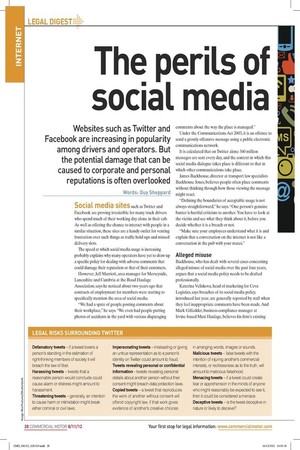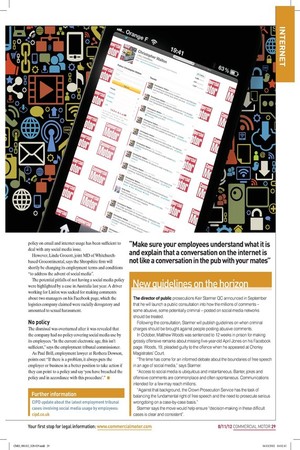The perils of social media
Page 19

Page 20

If you've noticed an error in this article please click here to report it so we can fix it.
Websites such as Twitter and Facebook are increasing in popularity among drivers and operators. But the potential damage that can be caused to corporate and personal reputations is often overlooked
Words: Guy Sheppard Social media sites such as Twitter and Facebook are proving irresistible for many truck drivers who spend much of their working day alone in their cab. As well as offering the chance to interact with people in a similar situation, these sites are a handy outlet for venting frustration over such things as traffic hold-ups and missed delivery slots.
The speed at which social media usage is increasing probably explains why many operators have yet to draw up a specific policy for dealing with adverse comments that could damage their reputation or that of their customers.
However, Jeff Marriott, area manager for Merseyside, Lancashire and Cumbria at the Road Haulage Association, says he noticed about two years ago that contracts of employment for members were starting to specifically mention the area of social media.
“We had a spate of people posting comments about their workplace,” he says. “We even had people putting photos of accidents in the yard with various disparaging comments about the way the place is managed.” Under the Communications Act 2003, it is an offence to send a grossly offensive message using a public electronic communications network.
It is calculated that on Twitter alone 340 million messages are sent every day, and the context in which this social media dialogue takes place is different to that in which other communications take place.
James Backhouse, director at transport law specialists Backhouse Jones, believes people often place comments without thinking through how those viewing the message might react.
“Defining the boundaries of acceptable usage is not always straightforward,” he says. “One person’s genuine banter is hurtful criticism to another. You have to look at the victim and see what they think about it, before you decide whether it is a breach or not.
“Make sure your employees understand what it is and explain that a conversation on the internet is not like a conversation in the pub with your mates.”
Alleged misuse
Backhouse, who has dealt with several cases concerning alleged misuse of social media over the past four years, argues that a social media policy needs to be drafted professionally.
Katerina Veliskova, head of marketing for Ceva Logistics, says breaches of its social media policy, introduced last year, are generally reported by staff when they feel inappropriate comments have been made. And Mark Gilfedder, business compliance manager at Irvine-based Maxi Haulage, believes his firm’s existing policy on email and internet usage has been sufficient to deal with any social media issue.
However, Linda Grocott, joint MD of Whitchurchbased Grocontinental, says the Shropshire firm will shortly be changing its employment terms and conditions “to address the advent of social media” .
The potential pitfalls of not having a social media policy were highlighted by a case in Australia last year. A driver working for Linfox was sacked for making comments about two managers on his Facebook page, which the logistics company claimed were racially derogatory and amounted to sexual harassment.
No policy
The dismissal was overturned after it was revealed that the company had no policy covering social media use by its employees. “In the current electronic age, this isn’t sufficient,” says the employment tribunal commissioner.
As Paul Brill, employment lawyer at Rothera Dowson, points out: “If there is a problem, it always puts the employer or business in a better position to take action if they can point to a policy and say ‘you have breached the policy and in accordance with this procedure’ . ” ■
New guidelines on the horizon
The director of public prosecutions Keir Starmer QC announced in September that he will launch a public consultation into how the millions of comments – some abusive, some potentially criminal – posted on social media networks should be treated.
Following the consultation, Starmer will publish guidelines on when criminal charges should be brought against people posting abusive comments.
In October, Matthew Woods was sentenced to 12 weeks in prison for making grossly offensive remarks about missing five-year-old April Jones on his Facebook page. Woods, 19, pleaded guilty to the offence when he appeared at Chorley Magistrates’ Court.
“The time has come for an informed debate about the boundaries of free speech in an age of social media,” says Starmer.
“Access to social media is ubiquitous and instantaneous. Banter, jokes and offensive comments are commonplace and often spontaneous. Communications intended for a few may reach millions.
“Against that background, the Crown Prosecution Service has the task of balancing the fundamental right of free speech and the need to prosecute serious wrongdoing on a case-by-case basis.” Starmer says the move would help ensure “decision-making in these difficult cases is clear and consistent”.
Further information
CIPD update about the latest employment tribunal cases involving social media usage by employees: cipd.co.uk









































